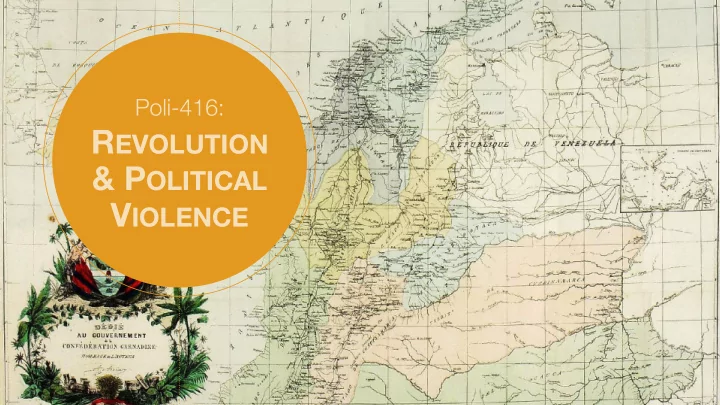

Poli-416: R EVOLUTION & P OLITICAL V IOLENCE
TODAY’S AGENDA 1 Legacies of war 2 What comes after war? More war 3 Trauma, justice, and rebuilding
Housekeeping Thursday is review for final Answer whatever questions/doubts you have Update website tonight/tomorrow
Worlds collide https://www.reddit.com/r/CombatFootage/comments/bfpd8q/ los_angelesarea_gangsters_fighting_for_assad_in/
Many wars eventually come to an end What comes after? More war Trauma and rebuilding
By 2000s, 90% of all civil wars were “repeat” civil wars Same actors, at war again, after some peaceful duration Yet many conflicts just end (El Salvador, Peru, Northern Ireland) Why do so many conflicts recur? Or spur new wars?
Post-US invasion elections bring Shi’a to power, led by Maliki Creates Shi’a-only coalition, excludes Sunni from power Lethal repression of peaceful Sunni protests, torture, mass arrests Cooperated with (paramilitary) Shi’a militias
ISIS capitalized on these tensions by making calls to sectarian war What did “the hell after ISIS” say about this?
Sometimes war recurs because winners abuse the losers This fear of abuse is why negotiations are so difficult in the first place Given war recurrence is very costly, why do this? Misguided expectations Fear, unsteady hold on power Weak control of security forces
With uncertain hold on power, Maliki takes from Hussein playbook “‘In short, Maliki’s one- man, one-Dawa-party Iraq looks a lot like Hussein’s one-man, one- Baath Party Iraq.’”
Uncertainty and fear of retaliation or challenge can spur post-conflict violence Relevant actors must have security guarantees These might be provided by third parties (short run) Or institutional arrangements, such as power-sharing agreements or decentralization (long-run)
Civil Society Some evidence that bringing civil society into peace processes can help reduce conflict resurgence Involvement of churches, political parties, social organizations, etc., increases legitimacy and trust in post-conflict government Civil society organizations can constrain people who support warring sides
Civil Society Basic idea: have civil society representatives at peace talks to represent their constituents interests Growing interest in this idea, but there are problems
Colombia’s peace process Women’s groups, minority groups bring language promoting inclusion/protection/promotion of women’s LGBT issues
Evangelicals not on board “The agreement violates evangelical principles like that of family values when it equates respect for women with these [LGBT] groups” Evangelicals (~10 million) vote “NO” in high proportions Rewritten agreement removes sensitive passages
The whole referendum idea was to bring public in to peace process Experiment right during referendum Two agreements —> Choose one (repeat over and over)
Justice - retribution: No jail (baseline) jail for HR violators jail for all FARC Justice - reparations: No reparations (baseline) FARC ask forgiveness FARC pay victims Political - elections: No compete (baseline) FARC competes FARC competes + seats Reform - drug policy: Aerial erradication (baseline) Manual eradication Substitution program Reform - land: No transfer (baseline) small transfer large transfer Reintegration - aid: No aid (baseline) 90% min. wage for demob. 200% min. wage for demob. -5.0% 0.0% 5.0% 10.0% Pr(choose agreement)
Voted no Voted yes Justice - retribution: No jail (baseline) jail for HR violators jail for all FARC Justice - reparations: No reparations (baseline) FARC ask forgiveness Voters very divided on FARC pay victims Political - elections: questions of punishment No compete (baseline) FARC competes FARC competes + seats Reform - drug policy: NO voters wanted more Aerial erradication (baseline) Manual eradication punishment most of all Substitution program Reform - land: No transfer (baseline) small transfer large transfer Reintegration - aid: No aid (baseline) 90% min. wage for demob. 200% min. wage for demob. -10.0% 0.0% 10.0% 20.0% Pr(choose agreement)
Civil society Bringing in civil society might strengthen agreements But also brings more people to the table who can veto agreements Might also bring (tangential) societal conflicts into peace building
Recommend
More recommend